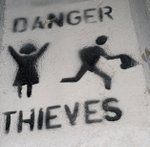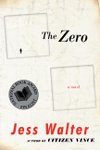A little interview we stole from HarperCollins:
Q: What was the inspiration behind this book? Obviously, the terrorist attacks of September 11th, but did you have any personal connection to the terrible events of that day that informed this story?
JESS WALTER: I spent a few months in 2001 working in New York. Five days after the attacks I came back (I was there helping Police Commissioner Bernard Kerik polish his memoir.) During that week, I wandered around Ground Zero like a lot of other well-meaning people, trying to help. I wrote a version of the opening paragraph of the novel that first week.The book began to form in my mind when I returned home to Washington State in October and saw how, outside New York, these attacks were an abstraction, certainly terrifying, but not personal the way they were in New York and Washington, D.C. I grew more and more upset as I saw politicians and corporations use the attacks and our fears to further agendas or to make money (sometimes both).Worst of all, we were a party to this propaganda. As a culture we punished dissension and hid behind a kind of commercial nationalism (If we don’t drink Sprite the terrorists have won) as we drifted toward war. None of it made sense. Our stunted grief was like the dissociative reaction I describe in the book. I grew fascinated with our reaction to these events (think of it as a 9/12 novel). I recall vividly the moment the book began to form in my mind: I had just arrived home from New York and was driving in my car and saw a sign that read, “God Bless America. New Furniture Arriving Every Day.” I began The Zero that day.
Q: What do you think of the debate over whether it’s “too soon” to tell such stories—to write books and movies—about the terrorist attacks of 9/11?
JW: Five years after Pearl Harbor, America had defeated Nazism and Japanese imperialism. Five years after 9/11, two-thirds of Americans believe we’re in worse shape. We were attacked by lunatics hoping to ignite a war in the Middle East, and in response, we ignited a war in the Middle East. Maybe we NEED to write and talk and see movies about 9/11 and about Iraq and about WMD and about torture. Maybe we need to sacrifice and serve and suffer and grieve and rant and howl with inappropriate laughter. Maybe we need to wake up.The Zero is about the aftermath of an unnamed tragedy in an unnamed city, in part because I wanted to acknowledge the unspeakable tragedy of the real Ground Zero. And yet this is not a glancing portrait in which the events of 9/11 exist merely as a backdrop (“The cocktail parties were especially grim that season.”) It’s about how we allowed ourselves to be anesthetized by pop culture and the real estate boom and the recovery of our 401Ks and sleep walked through the last five years. I hope that, in its surreal, darkly funny way, the novel reflects our irrational reaction to events that will define our generation.
Q: What type of access or research into the experiences of police officers and officials at Ground Zero did you have? And what about with federal agencies such as the CIA and FBI? (The book is a pretty damning indictment of their “blind leading the blind” performance.)
JW: I had fly-on-the-wall access to an incredible swath of New York in those weeks afterward, listening in on meetings between city and federal officials, watching crews look for bodies, seeing cops mourn in bars, listening to victims’ families search for answers, and watching everyday people try to do something … anything. As for intelligence agencies and their turf wars, screw-ups and cover-ups, that’s been the history of American intelligence, up to and after 9/11 (something I saw researching my first book, Ruby Ridge). We’re not likely to find out what’s been done by these agencies for years but if history teaches us anything, it’s that we’ll find out that the tools used to battle terrorism have been misused elsewhere (electronic surveillance, anyone?) Remember, the FBI used many of the same methods against the KKK and Martin Luther King.But it’s important to remember this book is not reporting. It’s a satirical novel whose rules are its own. It’s not about our leaders or our government or the NSA or even the Department of Documentation. It’s about us.
Q: The idea of memory and how we choose to give context to our memories plays a huge role in this book. Why did you want Remy to suffer from the partial loss of his memory? Why is it that he can’t remember the parts of his life where he’s actually doing the dirty work of his job?
JW: Remy’s mysterious “condition” is a version of what I felt the last five years, lurching along, constantly wondering how events came to pass and worrying about what seemed to be happening on my behalf. He experiences gaps, and if he doesn’t remember “the dirty work,” it does pose an interesting question about his role in all this, whether he’s willfully forgetting the awful things he does. As I began to write a novel in which the protagonist skips from scene to scene—besides thinking it felt funny and fresh—I began to think of the remote-control nature of our attention span now. We watch one thing and then, when it bores us, we turn the channel, or we surf to another website. After 9/11, we watched terrorism on TV for a while, but then we turned to American Idol.
Q: Do you see Remy as an archetypal figure for all Americans in the aftermath of the September 11th attacks (a sort of present day Yossarian)? If so, why does Remy never recover from his ailments?
JW: For me, Remy is archetypal, although I’m not sure any one character can represent all Americans. But he definitely reflects what I felt in the last few years: a constant sense of “How did we get here?” I have to think others have felt that way, too. As for his recovery, as the novel progressed, I began to see that Remy had no good choices, that no matter what he did, events rolled inexorably downhill. This seems to be what we face, beginning with our decision over what to do in Iraq. And there will be more impossible choices like this. Can Remy recover? I guess that remains to be seen.
Q: There is an almost romantic appreciation for the mundane details of everyday life in this book – the world of “pink real estate agents,” the idea of the city that rises up every day to collect its garbage, transport its residents, etc. Do you think that the stuff of “normal life” is the key to our recovery or just an illusion that we create for ourselves?
JW: Both! There is certainly something romantic about the recovery of normalcy. We all woke up on September 12 and realized suddenly how good we had it two days earlier. Instant nostalgia. Part of that romance, for me, is with the city of New York itself, which has shown itself to be so amazingly resilient. The “normal life” has been our salvation but, as such, it is a beautiful illusion. Real estate—with its self-serving optimism—is a clean representation of the world in which we’ve taken refuge. This is why the real estate agent in The Zero uses the same language as George W. Bush. And why I wonder if our sense of security in the last couple of years isn’t just another bubble of irrational optimism.
Q: Throughout the book, the wreckage and debris piled up at “The Zero,” as well as the pervasive smell it gives off, gradually disappears and, with it, whatever remained of all those lives that were lost in the attacks. Do you think that, over the last five years, we have lost touch with the real human losses from that terrible day, now that the actual site has been wiped clean?
JW: I was stunned when I returned to Ground Zero a few years afterward. Of course it had to be cleaned up. But other than those people who lost someone they loved, I do think the rest of us lost touch with the human cost of that day, just as the families of soldiers lost in Iraq have to bear the brunt of that war while the rest of us have sacrificed almost nothing (again, unlike the World War II generation.) In the novel the cleanup represents that papering-over of our grief and responsibility. Remy’s vision is that we’ve turned this painful, visceral place into just another construction site, the future home of a business park. Five years later, it’s sad to see the squabbling over the site and proper balance between returning commerce to the area and establishing a memorial.
Q: Do you see this as a hopeful book?
JW: Oh, sure. What did Kafka say: There is infinite hope. But not for us.
Right. Here she is. In all of her glory. Our little space on the world wide web to discuss three of the most mind-blowing, bone-crushing, spine-chilling, mouth-watering, eye-popping, cake-baking, chimney-sweeping, crime-fighting books set to be published in the coming months.
Read, enjoy, and feel free to post any of your thoughts or questions about the books or anything else!
Subscribe to:
Post Comments (Atom)






1 comment:
Hey, here is that website i was talking about where i made the extra cash.. later! i'm going to cali next week..check this out
Post a Comment